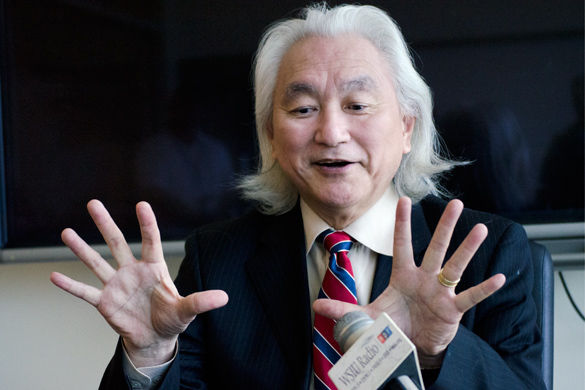Michio Kaku takes Salukis to the future
April 22, 2015
Students and community members had their minds blown with the possibilities of the future Wednesday night.
SIU President Randy Dunn welcomed Michio Kaku, a renowned theoretical physicist at the City College of New York and best-selling author, to the university.
Dunn said Kaku’s celebrity status by appearing on shows such as “Nightline” and “Good Morning America” and in documentaries was a factor for filling the ballrooms of the Student Center. The auditorium’s additional 300 seats were used for students to watch a video stream, but many were packed like sardines in standing room only.
Advertisement
“We believe that bringing these thought leaders to our campus is critical to what it means in being a university,” Dunn said. “By doing this, we’re enhancing the academic experience for students and further engaging the community in the academic and intellectual life of our great community.”
Kaku is a co-founder of string theory, the basis for the creation of everything in the universe, but also predicts the future based on science and interviews. His latest book “The Future of the Mind” explores new technology, consciousness and human advancement.
“Ninety nine percent of what people think about the future comes from cartoons — it comes from the movies,” Kaku said. “How much of it comes from scientists? Zero.”
{{tncms-asset app=”editorial” id=”73e59a4e-e93e-11e4-9010-93b4be41c76e”}}
He said people come up to him all the time asking for flying cars because they saw them on “The Jetsons.” Too many people see that as the future, as opposed to concepts with practical applications.
While flying cars are a possibility, the real future of society comes from increased digitalization.
He said wealth is tied to technological innovations, starting with steam-powered tools. After that, electricity was the next innovation and then high-powered technology, such as lasers and GPS. Kaku predicts molecular science will be the fourth great wave of innovation.
Advertisement*
According to Moore’s Law, developed by Intel co-founder Gordon Moore, computing power doubles every two years. This sounds great because cell phones today have more computing power than what NASA used to send men to the Moon in 1969.
Kaku said nearly every item would have a computer chip implanted in it because they will only cost a penny in 2020, causing the word “computer” to disappear from the human lexicon.
The home desktop computer will be in eyeglasses and contacts. They will work like Arnold Schwarzenegger’s character in “The Terminator,” showing people’s names and biographies or translating foreign languages. Giant screens will fade to electronic paper, easily folded and stored in homes, he predicted.
“Maybe tonight there is a cocktail party with some very important people, but you don’t know who they are. In the future, you will know exactly who to suck up to,” Kaku said to a chorus of laughs.
These new smart glasses, even more powerful than Google Glass, can put information just a blink away.
“Who are the first people to buy Internet contact lenses? College students taking final exams,” he said to more laughs. “Why should information be a secret? Information should be free. At universities, we should teach principles and concepts, not memorizing the periodic chart.”
As important as it is to not come off as a goofball at a party, the digitalized future will have much greater medical implications.
Toilets will have the power to analyze our waste for fragments of cancer genes, years before the disease takes hold. Microchips can be the size of a pill, so swallowing one with a camera can make diagnoses even easier, giving a different meaning to the phrase “Intel inside.”
Paralyzed and paraplegic people will have more hope despite illnesses. But cases of this can even be found today.
A paraplegic man kicked-off the World Cup last year with mind-operated exoskeleton, developed at Duke University.
Kaku said memories can already be recorded for brief amounts of time, but much larger ones will be available in the future. People with Alzheimer’s can use pacemakers for their brain, to fill their mind up with the lost memories. From there, these memories could be uploaded into a library of souls, where people can visit and talk with ancestors, instead of reading through boring books.
With all of these increases in human connectivity to technology, some ethical questions arise.
There are chances a false memory could be implanted into someone’s mind, making him or her confess to things they have not done.
But Kaku believes there are always dangers with any new technology.
“A hammer can be used to build a house, our modern society, but hammers can also be used to kill people,” he said. “We will have to have regulations to make sure this technology is not in the wrong hands.”
After Kaku’s speech, Dunn was at a loss for words.
“It was awesome,” he said.
Sam Beard contributed to this story
Austin Miller can be reached at [email protected]
Advertisement







